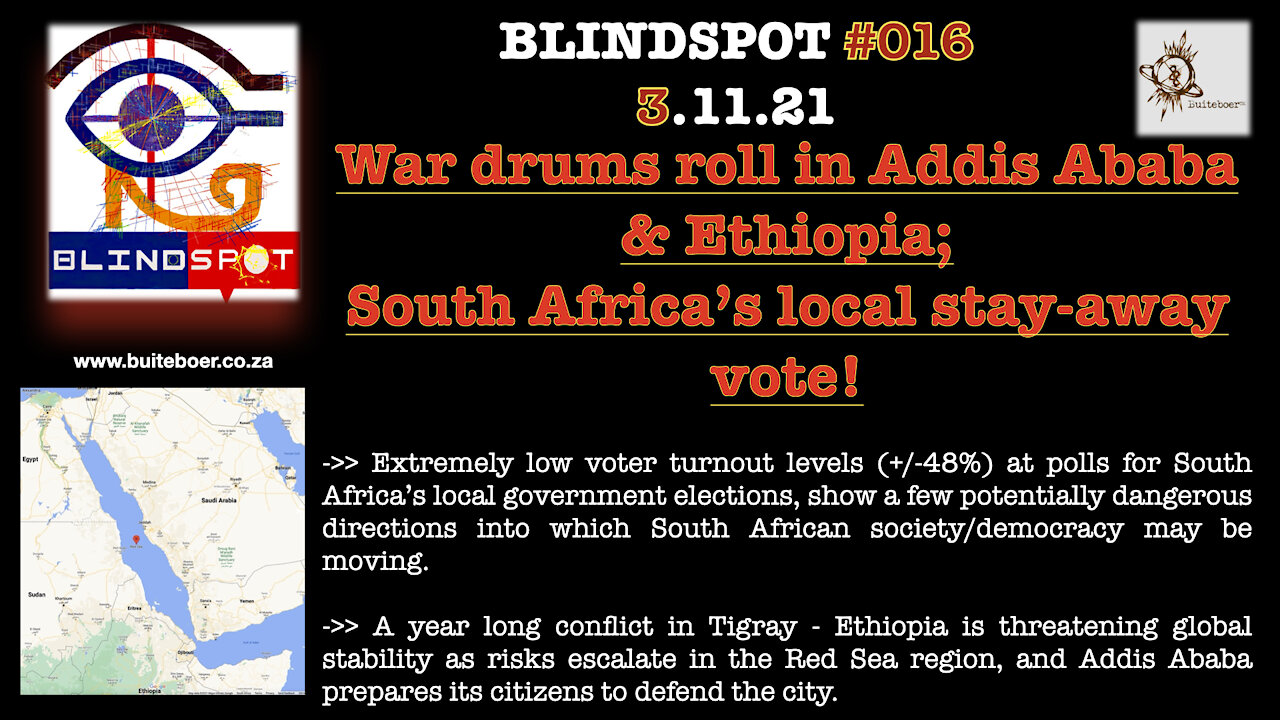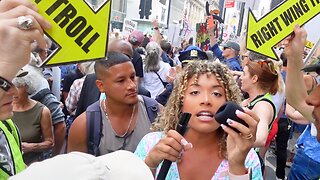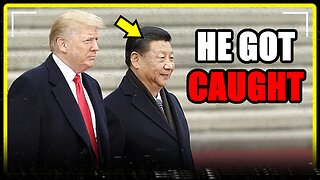Premium Only Content

Blindspot #016 - War drums roll in Addis Ababa & Ethiopia; South Africa’s local stay-away vote!
For more visit - www.buiteboer.co.za
Blindspot firstly checks in on what turns out to have been a rather subdued affair as exhibited in the extremely low voter turnout levels at the polls for South Africa’s local government elections, held on 1 November, 2021. SA Broadcasting Service (SABC) reported on 2 November that the CSIR expects total turnout to be 48% of eligible voters. There are most definitely a whole truckload of blindspots one could identify that contributed to such levels of political apathy.
The non-vote is a vote for the non-alternatives, the non-ideas, and non-visions, and the non-policies political parties and want-to-be rulers try to sell to the voting public. This means, the vote that stayed away, that silent vote, is a potential comment on the non-solution most current active parties offer citizens.
The stay at home non-vote is a vote against the political classes positioning themselves, their pals, their pockets, and patio’s for the spoils of ‘being connected to’ and in line to pick up some of the spoils that can be looted from an already fundamentally wrecked state.
Sometimes the best Blindspots hide in the open. To conclude our non-thoughts on the non-votes that ‘voted’ for other things on election day, the below is a quote from an article by Sasha Planting, Daily Maverick, if the state itself says the below about local government, then, well, it is broken:
“In its State of the Government report submitted to Cabinet in August, the Department of Cooperative Governance and Traditional Affairs categorised just 16 out of 257 municipalities in SA as “stable”. Raw sewage runs through the streets of townships and into rivers, polluting waterways and spreading disease. Streetlights don’t work, enabling criminals, and streets are disintegrating, congesting traffic and adding to vehicle maintenance costs.”
Ethiopia & the Red Sea
On 2 November, Aljazeera breaks a story entitled: Addis Ababa asks residents to prepare to defend Ethiopian capital. Exactly one year ago conflict erupted in Ethiopia’s Tigray region. While regular headlines treat this as another bad news headline, it is much more than that. The Tigray conflict began in November 2020 after months of tension between the government and the region's ruling party, the Tigray People's Liberation Front (TPLF).
The TPLF dominated Ethiopian politics for almost three decades but lost power when Prime Minister Abiy Ahmed took office in 2018 amid anti-government protests.
In order to understand the apparent spontaneous eruption of armed violence in Tigray, it is necessary to look into some historical blindspots. The crux is quite interesting, and might sound eerily familiar to South African ears.
For more visit www.buiteboer.co.za
-
 0:10
0:10
Khadaraqli
4 years agoAddis Ababa, Airport
10 -
 LIVE
LIVE
The Bubba Army
21 hours ago#1 Documentary IN THE WORLD! - Bubba the Love Sponge® Show | 9/04/25
6,876 watching -
 39:31
39:31
Her Patriot Voice
12 hours agoBlack Conservative Surrounded + ROBBED By Leftists!
436 -
 13:25
13:25
The Gun Collective
13 hours agoWOW! A LOT of new GUNS just dropped!
5054 -
 LIVE
LIVE
BEK TV
22 hours agoTrent Loos in the Morning - 9/04/2025
340 watching -
 8:13
8:13
Geoff_Tac
1 day agoMAC 1014 Shotgun (Benelli Clone)
522 -
 22:30
22:30
Ohio State Football and Recruiting at Buckeye Huddle
12 hours agoOhio State Football: How Matt Patricia Confused Arch Manning and Texas
2.77K -
 9:07
9:07
MattMorseTV
17 hours ago $3.61 earnedTrump just BLASTED the CCP.
22.6K45 -
 58:44
58:44
The Official Corbett Report Rumble Channel
12 hours agoTurning the Tide on 9/11 with Curt Weldon
3.9K15 -
 10:47
10:47
Nikko Ortiz
15 hours agoThese Tik Tok Clips Are Extremely Painful...
17.4K3